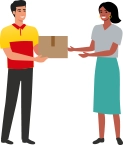CUSTOM DUTIES AND TAXES

Got a question about paying Custom duties and tax with DHL? Here are our FAQs to help you find the answer to your question. If you can’t find the answer you’re looking for, get in touch with our team for further assistance.
What are Customs duties and taxes?
When transporting goods across international borders, packages are subject to duties and taxes as determined by Customs in the destination country. When sending parcels internationally, it’s important to understand what duties and taxes are.
How are duties and taxes calculated?
Whether a shipment is a gift or not, it must still go through an import procedure determined by Customs law in the destination country. The shipment is cleared through customs based on the origin country, value and quantity.
The calculation of duties depends on the assessable value of a dutiable shipment. For the purpose of this calculation, dutiable goods are given a classification code that is known as the Harmonized System code. This system has been assigned by the World Customs Organization and continues to evolve.
Why doesn't DHL include duties and taxes in its delivery prices?
The Customs authorities in the destination country determine whether any duties and taxes are applicable when the parcel arrives. This is based on the information provided on the parcel label (or waybill) and Customs paperwork, in particular, the contents, declared value and weight.
Why is the receiver being asked to pay Customs duties and taxes?
Duties and taxes are charged by Customs in the destination country and the receiver is responsible for paying them.
To make it simpler, DHL will pay the charges on the receiver's behalf and collect payment from the receiver either before or on delivery. Generally, we are unable to deliver parcels until these have been paid.
DHL Express does offer the opportunity for DHL account holders to pay for duties and taxes on behalf of the receiver.
In that case, after shipment delivery, DHL invoices customers for the duties and taxes we paid on their behalf at the destination, plus a small administration fee. This optional service is called Duties and Taxes Paid (DTP).
How do I pay duties and taxes?
If you are expecting or have received a delivery in the UK, you can pay your Duty and VAT charges quickly and securely online.
- If you have received an SMS or email message in respect of Duty and VAT charges for an import pending delivery, please follow the link in your message to make a payment online or go to On Demand Delivery.
- If you have received an invoice, you can pay your Duty and VAT charges quickly and securely online using our ePayments service.
Do I need to create Customs paperwork for my parcel?
A Customs invoice is required for all parcels containing non-document items, except for parcels being sent within the UK and to the Channel Islands.
If you are dropping off a parcel at a DHL Service Point, your Customs invoice will be printed in store, along with your parcel labels.
When you book online with DHLitNow, you will be prompted to complete Customs information where required and the invoice will print automatically with your parcel labels.
If you book with DHL by phone, our friendly Customer Service team will guide you through what paperwork is needed.
Can I pay duties and taxes instead of the receiver?
If you don’t have a DHL account, it’s not possible for you to pay the duties and taxes instead of the receiver.
If you have a DHL account, you can pay duties and taxes instead of the receiver. If you’d like to pay the taxes yourself, find out how to get a DHL account.
Do you have any other questions about paying duties and tax with DHL? Feel free to get in touch with our team.
What is the difference between document and non-document items?
It is important to correctly classify your international letter or parcel as document or non-document to avoid penalties, additional costs or delays. Also, describe the contents as precisely as possible to avoid vague or generic descriptions.
Documents, also known as non-dutiable shipments, are letters, statements or other correspondence that have no commercial value and are not intended for resale. No commercial invoice is therefore required to accompany it. Examples of documents include visa applications, business correspondence, legal documentation or certificates.
Non-documents, also known as dutiable or product shipments, are products or goods for personal or commercial use. Multiple copies of a commercial invoice have to accompany the parcel. If your item is for personal use then you have to include multiple copies of a proforma invoice. Examples of non-documents include clothing, car parts, sports equipment or books. These commercial and proforma invoices are created for you when you ship with DHL Express. Just follow the booking instructions.
Note that Customs regulations in some countries may classify a document as a non-document based on its destination, weight and value. For example, educational materials, magazines, books or documents intended for resale are also classified as non-documents and will incur Customs duties and taxes. If you are in doubt about how to classify your parcel then speak to our Customer Service team.
Still have a question?
Perhaps one of these will help
to top






